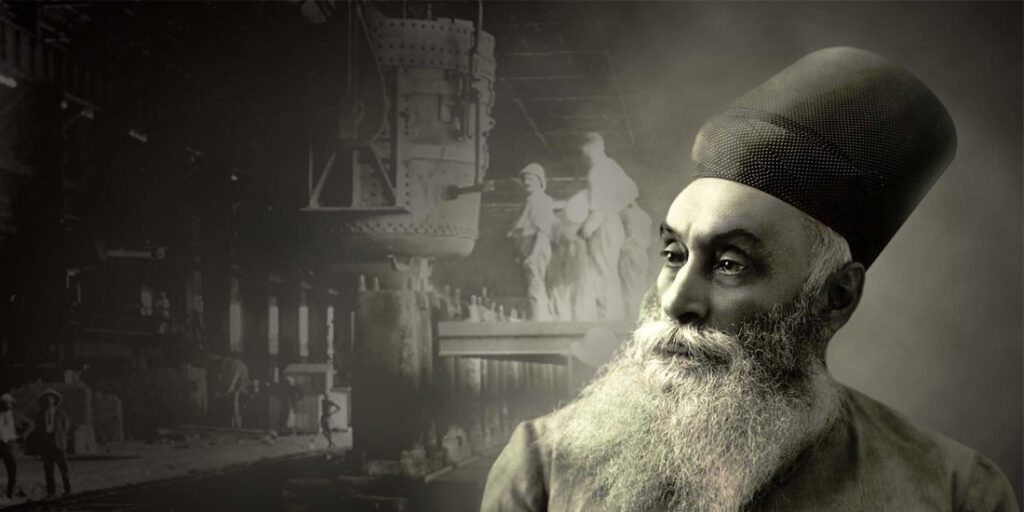Jamsetji Tata Biography: early life, education, business
-by Jaya Pathak
Jamsetji Nusserwanji Tata, born on March 3, 1839, and passing away on May 19, 1904, is an iconic figure in Indian industrial history, renowned for founding the Tata Group, India’s largest conglomerate. Acknowledged as the “Father of Indian Industry,” Tata’s impact reverberates as a pioneering industrialist, visionary philanthropist, and the creator of the city of Jamshedpur.
In the annals of Indian business, Tata’s legacy is profound. Hailing as a merchant in his early years, he orchestrated transformative ventures in the cotton and pig iron industry, imprinting his name as a pivotal architect of the modern Indian economy. Revered by Jawaharlal Nehru as a “One-Man Planning Commission,” Tata’s visionary leadership transcended typical business acumen, charting a course for industrial development in India.
A standout achievement among Tata’s endeavours was the establishment of the Tata Iron and Steel Works in Jamshedpur, a testament to his commitment to industrial progress. His far-reaching impact is encapsulated in his recognition as the greatest philanthropist of the century, an honour bestowed upon him by various polls and rankings.
Tata’s philanthropic spirit is exemplified by his enduring contributions, with the “Hurun Philanthropists of the Century” (2021) ranking him first, citing total donations nearing $102.4 billion. Remarkably, Tata’s philanthropic journey commenced as early as 1892, showcasing a longstanding commitment to societal well-being.
Beyond business and philanthropy, Tata’s influence extends to urban planning, notably seen in the creation of Jamshedpur. This planned city, designed for the welfare of its residents, stands as a living legacy of Tata’s holistic vision.
The Tata Group, under his guidance, evolved into a diversified conglomerate, encompassing sectors such as steel, automobiles, telecommunications, and more. Tata’s enduring impact on the industrial landscape, coupled with his philanthropic ethos, has left an indelible mark on India’s economic and social fabric.
Early Life
Jamsetji Nusserwanji Tata, born on March 3, 1839, in Navsari, Gujarat, born in a Zoroastrian Parsi family. His ancestors sought refuge in Mughal India, escaping persecution during the Muslim conquest of Persia. Breaking away from the family’s priestly tradition, Jamsetji’s father, Nusserwanji, transitioned from priesthood to become the first businessman in the family, establishing an export trading firm in Mumbai.
Jamsetji’s unique journey unfolded against the backdrop of a Zoroastrian upbringing but marked by a departure from the norm. Recognizing his son’s intellectual prowess, Nusserwanji ensured that Jamsetji received a formal Western education, setting him apart from his contemporaries. This decision to foster modern education led Jamsetji to Bombay, where he joined his father’s export-trading firm at the age of 14 and pursued further education at Elphinstone College, eventually graduating as a “Green Scholar.”
Amid the post-1857 upheavals following the Indian Rebellion, Jamsetji played a pivotal role in expanding his father’s business. The firm flourished under his guidance, establishing robust branches in Japan, China, Europe, and the United States. Despite the challenging times, Jamsetji’s acumen and strategic vision propelled the business forward.
His exposure to the opium trade during travels to China opened his eyes to the thriving cotton industry. Instead of adhering strictly to his father’s intentions, Jamsetji recognized an opportunity in the booming cotton sector. This shift in focus reflected his ability to adapt to changing circumstances and seize emerging prospects.
The turning point came when Tata ventured beyond the opium trade and identified the potential for substantial profits in the flourishing cotton industry. His keen observations and foresight allowed him to envision a different trajectory for the family business. This pivotal moment marked the beginning of Jamsetji Tata’s transformative journey into industrial entrepreneurship.
Jamsetji’s entrepreneurial spirit laid the foundation for his future endeavours, setting the stage for the establishment of the Tata Group and his role as a key architect of India’s modern industrial landscape. His departure from traditional expectations, coupled with a forward-thinking approach, positioned him as a visionary whose legacy transcends conventional boundaries. Jamsetji Nusserwanji Tata, the trailblazer, exemplifies the extraordinary fusion of heritage, innovation, and a relentless pursuit of excellence that defines his enduring impact on Indian industry and society.
Business
Jamsetji Nusserwanji Tata laid the cornerstone of his legacy as the founder of the Tata Group, India’s largest conglomerate. His remarkable journey commenced in the family’s export-trading firm, where he worked until the age of 29. In 1868, with ₹21,000 capital, equivalent to US$52 million in 2015, Tata ventured into entrepreneurship by founding a trading company.
His transformative vision became evident when he acquired a bankrupt oil mill in Chinchpokli, converting it into a profitable cotton mill named Alexandra Mill in 1869. Two years later, Tata sold the mill for a profit. Undeterred by conventional norms, in 1874, he established the Central India Spinning, Weaving, and Manufacturing Company in Nagpur, defying scepticism about choosing an unconventional location.
Nagpur’s affordability, abundant resources, and strategic railway convergence fueled Tata’s success, leading to the establishment of Empress Mill in 1877. Jamsetji Tata harboured grand ambitions, envisioning an iron and steel company, a world-class educational institution, a unique hotel, and a hydroelectric plant. While only the hotel, Taj Mahal Hotel, became a reality during his lifetime, Tata’s foresight set the stage for future achievements.
In 1885, Tata’s attempt to distribute Indian textiles in French Colonies failed, prompting the acquisition of Dharamsi Mills in Bombay. The subsequent sale of Dharamsi Mills funded the purchase of Advance Mills in Ahmedabad, showcasing Tata’s commitment to integrating industrial progress with community development.
Tata’s legacy extended beyond business to the principles of Swadeshi, aligning with the Swadeshi Movement’s ethos, promoting domestic production and boycotting imports. The Swadeshi Mill in Bombay epitomized Tata’s commitment to quality cloth production, challenging the dominance of imported goods.
A staunch supporter of Swadeshiism, Tata actively contributed to the movement even before its formal initiation in 1905. His vision for India’s self-sufficiency in cloth production led to the establishment of the Swadeshi Mill, reflecting his commitment to refining Indian textiles and reducing dependence on foreign imports.
Tata’s innovative spirit and commitment to Swadeshi ideals materialized in his experimentation with cotton cultivation techniques. Introducing the ring spindle in his mills, he sought to enhance the quality of Indian cotton and position India as a leading exporter of fine cloths.
Although Jamsetji Tata did not witness the fulfilment of all his goals, his successors realized his vision:
- Tata Steel, formerly TISCO (Tata Iron and Steel Company Limited), emerged as Asia’s first and India’s largest steel company, ranking among the world’s top five.
- The Indian Institute of Science in Bengaluru became a premier institution for research and education in Science and Engineering.
- Tata Power Company Limited, formerly Tata Hydroelectric Power Supply Company, stands as India’s largest private electricity company.
Beyond business acumen, philanthropy defined Jamsetji Tata’s legacy. Recognized as the greatest philanthropist of the 20th century, he donated generously to education and healthcare. His estimated donation of $102 billion, adjusted for inflation, underscores his enduring impact on societal welfare. Jamsetji Nusserwanji Tata’s pioneering spirit, visionary endeavours, and philanthropic contributions collectively form a legacy that continues to shape India’s industrial landscape and societal well-being.
Legacy
Jamsetji Tata’s vision for an iron and steel plant materialized in Sakchi village, Jharkhand, laying the foundation for a transformative journey. The nascent village evolved into a vibrant town, and in homage to the visionary industrialist, the railway station was christened Tatanagar. Over time, the once modest village burgeoned into a thriving metropolis, now renowned as Jamshedpur in Jharkhand, a name bestowed upon it in honor of its founder.
The metamorphosis of Sakchi into Jamshedpur symbolizes the indelible impact of Tata’s endeavors on the landscape and trajectory of the region. The bustling metropolis stands as a testament to Tata’s foresight, resilience, and commitment to industrial progress. Sakchi, now seamlessly integrated into the fabric of Jamshedpur, encapsulates the rich legacy of Tata’s pioneering spirit.
Tatanagar, the railway station that bears witness to the ebb and flow of progress, embodies the symbiotic relationship between infrastructure development and industrial growth. The name itself reverberates with the legacy of a man whose vision transcended conventional boundaries, reshaping not only the geography but also the socio-economic fabric of the region.
As the founding member of the Tata family, Jamsetji Tata’s legacy extends beyond the realms of industry. His imprint on Sakchi, now Jamshedpur, echoes through time, encapsulating a saga of transformation, innovation, and enduring impact. Today, the city stands as a living tribute to the visionary who, with unwavering determination, sowed the seeds of progress that continue to flourish in the heart of Jharkhand.
Biography books
- “The Creation of Wealth: The Tatas from the 19th to the 21st Century” by R. M. Lala
- “The Tatas: How a Family Built a Business and a Nation” by Girish Kuber
- “Jamsetji Nusserwanji Tata: A Chronicle of His Life” by Fank Harris
Quotes
- “Freedom without the strength to support it and, if need be, defend it, would be a cruel delusion.”
- “In a free enterprise, the community is not just another stakeholder in business, but, is in fact, the very purpose of its existence.”
- “There is one kind of charity common enough among us… It is that patchwork philanthropy which clothes the ragged, feeds the poor, and heals the sick. I am far from decrying the noble spirit which seeks to help a poor or suffering fellow being… [However] what advances a nation or a community is not so much to prop up its weakest and most helpless members but to lift up the best and the most gifted, so as to make them of the greatest service to the country.”
- “Be sure to lay wide streets planted with shady trees, every other of a quick-growing variety. Be sure that there is plenty of space for lawns and gardens. Reserve large areas for football, hockey and parks. Earmark areas for Hindu temples, Mohammedan mosques and Christian churches.” —Tata in a letter to son Dorab about his vision for the township that would eventually become Jamshedpur.
In commemorating Jamsetji Nusserwanji Tata, India recognizes not just a pioneering industrialist but a visionary whose ideals and contributions continue to shape the nation’s trajectory. His legacy lives on through the enduring success of the Tata Group and the transformative impact on the communities touched by his philanthropy.










